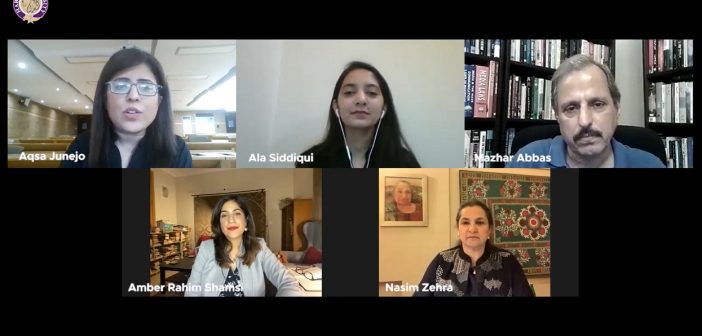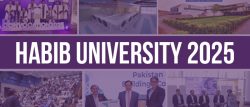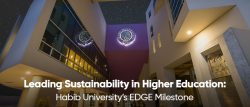The world is mired in grave challenges, facing a host of existential crises – some close, some not so much. However, the answer to a lot of these questions have to come from the young generation who will lead the world into the future.
This was discussed in a session on “Reflections from Chomsky: Pakistan amidst grim challenges” which was attended by senior journalists, analysts and television anchors Mazhar Abbas, Nasim Zehra and Amber Rahim Shamsi. The session was hosted by Aqsa Junejo, who leads Marketing and Communications at Habib University and co-hosted by Aala Masood Siddiqui, a Communication and Design major from Habib University’s class of 2020.
The session reflected on the warnings provided by Professor Noam Chomsky during the sixth Yohsin lecture at Habib University including the deterioration of democracy the world over, the destruction of the environment, the looming specter of nuclear war, the rise of the Novel Coronavirus (COVID-19) pandemic and the dangers of fake news.
Abbas, a veteran journalist who has been working in Pakistan for nearly 40 years, said that the world really changed after September 11, 2001, attacks on the World Trade Center in New York, noting that it led to extremism gaining greater electoral support the world over. The most profound effect was in India where the emergence of electoral support for the Bhartiya Janata Party (BJP) even forced the opposing left-wing party, the Congress, to adopt extremist stances, putting India’s secularism under threat.
In Pakistan, he said that democracy was in trouble since the very beginning. In the initial years, he said that the strong left wing were pushed out, the press and progressive elements were targeted.
“Pakistan has never been able to sow the seeds of democracy,” he said, adding that whenever democracy emerged, it was manipulated by the existing players. “Democracy is great unless it is manipulated.”
At the end of the day, we realize that a selective democracy has been happening in Pakistan, and largely because of this, democracy has never happened in Pakistan.
Zehra, a national security expert, author and anchor for 24 News television channel, said that the country was formed in a highly insecure environment. Hence, the architecture of democracy which emerged, by and large everyone appears to be in a battle mode.
“This is Pakistan’s crisis of democracy,” she said, adding that she sees more and more of this intolerance, embattled mindsets, inability to sit down, work together.
Shamsi is a seasoned journalist having worked for international and local media and currently heads communications at Tabadlab, said that there has been a rise of identity politics which has in turn seen the rise of extremist forces.
In Pakistan, she said that there is a problem of a colonial mindset of the state that the state needs to be protected first and then the people. This has led to an imbalance of power which has led to weakening of democracy.
I am afraid that these insecurities and instability that we have seen in the last few years is not going to go away and the reason is that there is still this disdain for political parties, politicians, this belief us vs them, populism, where there are very simple solutions to complex problems, she said.
Despite Professor Chomsky’s warning of the looming threat of nuclear war, Zehra said that the situation on the ground suggested that despite the rising rhetoric and low-intensity warfare such as the Kargil conflict, sabotages which continue but that both countries know that nuclear war is out due to a “balance of terror” of nuclear war. The evidence of that, she pointed out, is the continuing practice of sharing lists of nuclear installations irrespective of how bad the formal relationship is between the two countries.
“Unless one of the two countries decides that suicide, our utter and total annihilation is our aim, I don’t think nuclear war is on the cards,” she said, adding that the problem between the two countries still remains. As a solution, she suggested negotiations between the two countries.
Abbas recounted how Zulfikar Ali Bhutto, after becoming the prime minister of Pakistan, put in place the nuclear program of Pakistan and how a nuclear arms race began in South Asia following the Indian nuclear tests.
On the third threat, of environmental catastrophe, senior journalist and news anchor Amber Rahim Shamsi noted that there is great inequality in Pakistan which is made worse by the impacts of climate change and that Pakistan needs to do more than just mass tree plantation drives and become part of the global conversation on climate change.
“We are an already insecure country and climate [change]adds to that insecurity.”
The panelists, all of whom have worked for years in mainstream media, also spoke about the rise of fake news in recent years and the damage it has done, particularly in the context of the pandemic.
Abbas said that the fake news phenomenon, overall, presents the greatest threat to journalism. He said that people have stopped listening to rational arguments and pay more attention to sensation.
The ratings phenomenon, he said, has claimed professional and credible journalism as its biggest victim. In the Pakistani context, he said that where vaccinators are already targeted, fake news around vaccination is very dangerous.
In the end, Shamsi said that the new generation are far more self-aware and are adept at leveraging social media to organize around issues critical to them.
“The hope is that this generation who will find solutions, who are finding solutions, who are organizing, who are resisting, so more power to young people,” she said.
Abbas referred to the parting message of Professor Chomsky, suggesting that students must not lose the scientific approach and school of thought. He added that Habib University is a great opportunity for students who must grab it with both hands. Further, he said that people of his generation had done all that they could and that it was now up to the new generation to develop and take this country forwards.




